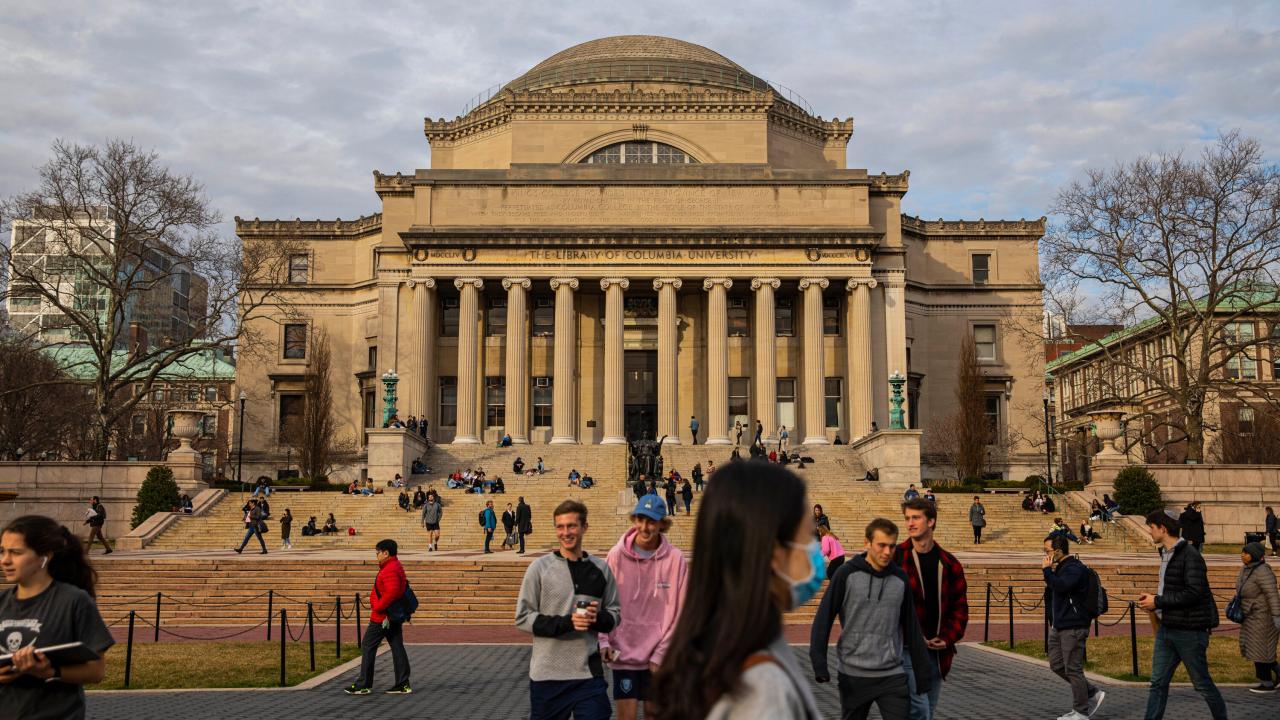Columbia University News takes center stage, showcasing the institution’s rich history, academic prowess, and global impact. From its esteemed faculty and groundbreaking research to its vibrant campus life and influential alumni, Columbia stands as a beacon of knowledge and innovation.
This article delves into the multifaceted world of Columbia University, exploring its academic excellence, research endeavors, student experiences, and global contributions. We’ll examine the university’s historical significance, cultural contributions, and the challenges and opportunities it faces in shaping the future of education and research.
Columbia University’s Academic Excellence
Columbia University is consistently ranked among the world’s top academic institutions, renowned for its rigorous academic standards, exceptional faculty, and groundbreaking research. Its prestigious reputation attracts top students and scholars from around the globe, fostering an intellectually stimulating environment.
Global Rankings and Reputation
Columbia University consistently ranks among the top universities globally. According to the 2023 QS World University Rankings, Columbia University is ranked #18 in the world. The university also ranks highly in various subject areas, including law, medicine, and engineering. Its academic excellence is recognized by organizations such as the Times Higher Education World University Rankings and the Academic Ranking of World Universities (ARWU).
Renowned Departments and Research Centers
Columbia University boasts a diverse range of renowned departments and research centers across various disciplines. Some notable examples include:
- The Columbia University Medical Center (CUMC), a leading academic medical center renowned for its groundbreaking research and clinical care. It houses world-class hospitals, including the NewYork-Presbyterian Hospital, and research centers focusing on areas like cancer, neurology, and infectious diseases.
- The Columbia Business School, a top-ranked business school, known for its rigorous curriculum, strong alumni network, and focus on innovation and entrepreneurship.
- The School of Engineering and Applied Science, a leading engineering school with strong research programs in areas such as computer science, electrical engineering, and mechanical engineering.
- The School of International and Public Affairs (SIPA), a globally recognized school for public policy, international relations, and development studies.
Impact of Columbia University Alumni
Columbia University alumni have made significant contributions to various fields, shaping the world with their achievements. Notable alumni include:
- Barack Obama, the 44th President of the United States, who earned a Bachelor of Arts degree in Political Science from Columbia University in 1983.
- Ruth Bader Ginsburg, the late Associate Justice of the Supreme Court of the United States, who earned a Juris Doctor degree from Columbia University in 1959.
- Jeff Bezos, the founder of Amazon, who earned a Bachelor of Science degree in Electrical Engineering and Computer Science from Princeton University in 1986. He also attended Columbia University’s MBA program for a short period before dropping out to pursue his entrepreneurial ventures.
Research and Innovation at Columbia: Columbia University News

Columbia University is a powerhouse of research and innovation, consistently pushing the boundaries of knowledge and shaping the future. With a vibrant community of faculty, students, and researchers, Columbia fosters an environment of intellectual curiosity and discovery, leading to groundbreaking advancements across diverse fields.
Columbia’s Research Impact on Society
Columbia’s research has a profound impact on society, addressing critical challenges and improving lives. Here are a few examples:
- Columbia researchers are at the forefront of combating climate change, developing innovative solutions for sustainable energy, and advancing our understanding of climate science. For example, the Earth Institute at Columbia is a global leader in climate research, conducting extensive studies on climate modeling, carbon sequestration, and renewable energy.
- Columbia researchers are leading the way in developing new treatments and cures for diseases, including cancer, Alzheimer’s, and HIV/AIDS. For example, the Columbia University Medical Center is a world-renowned center for medical research, with numerous breakthroughs in drug development and gene therapy.
- Columbia researchers are contributing to advancements in artificial intelligence, robotics, and data science, shaping the future of technology and its impact on society. For example, the Columbia Engineering School is a hub for cutting-edge research in robotics, machine learning, and computer vision, leading to innovations in areas like autonomous vehicles and healthcare.
Fostering Innovation and Technological Advancements
Columbia University is committed to fostering innovation and technological advancements through various initiatives:
- Columbia’s Technology Ventures program supports faculty and student entrepreneurs in developing and commercializing their inventions, helping to translate groundbreaking research into real-world applications.
- The university has established numerous research centers and institutes, including the Data Science Institute, the Center for Computational Biology, and the Earth Institute, providing a collaborative environment for researchers to tackle complex challenges and drive innovation.
- Columbia actively encourages interdisciplinary research, bringing together experts from diverse fields to address complex problems and foster new ideas. This approach has led to significant breakthroughs in areas like bioengineering, nanotechnology, and sustainable development.
Examples of Groundbreaking Research Projects, Columbia university news
Columbia University boasts a rich history of groundbreaking research projects that have made significant contributions to various fields.
- The development of the polio vaccine by Jonas Salk, a renowned virologist and researcher at Columbia University, was a landmark achievement in medical history, saving millions of lives and eradicating polio in many parts of the world.
- Columbia researchers played a pivotal role in the development of the Human Genome Project, a monumental effort to map the entire human genome, which has revolutionized our understanding of human biology and genetics, paving the way for personalized medicine and gene therapy.
- The discovery of pulsars, rapidly rotating neutron stars that emit radio waves, by Jocelyn Bell Burnell, a graduate student at Cambridge University, was a groundbreaking discovery in astrophysics, revolutionizing our understanding of the universe.
Campus Life and Student Experiences
Columbia University is renowned for its academic excellence, but it’s also a place where students thrive in a vibrant and diverse community. The university offers a wide range of social, cultural, and extracurricular activities, fostering a well-rounded and engaging campus experience. Furthermore, Columbia is dedicated to supporting student well-being through various resources and initiatives.
Student Body Diversity
The Columbia University student body is a melting pot of diverse backgrounds, perspectives, and experiences. With students from all over the world, the campus buzzes with a vibrant exchange of ideas and cultures. This diversity enriches the learning environment and fosters a sense of global citizenship among students. For example, the university has over 3,000 international students representing more than 130 countries, contributing to a rich tapestry of perspectives and experiences.
Social and Cultural Activities
Columbia University offers a plethora of social and cultural activities catering to diverse interests. Students can engage in various clubs, organizations, and events, fostering a sense of community and belonging. These activities provide opportunities for personal growth, exploration, and the development of new skills.
- Student Organizations: From academic societies to cultural clubs, sports teams, and political groups, there’s something for everyone. These organizations provide a platform for students to connect with like-minded individuals, pursue their passions, and make lasting friendships.
- Cultural Events: Columbia hosts numerous cultural events throughout the year, including concerts, theater performances, art exhibitions, and film screenings. These events showcase the university’s commitment to the arts and provide students with opportunities to engage with different cultures and artistic expressions.
- Social Gatherings: The university organizes social gatherings and events, such as dances, parties, and picnics, fostering a sense of community and camaraderie among students. These events provide opportunities for students to relax, socialize, and build connections outside the classroom.
Student Support Services
Columbia University recognizes the importance of student well-being and provides a comprehensive range of support services. These services aim to address students’ academic, personal, and mental health needs, ensuring a holistic and supportive learning environment.
- Academic Advising: Students have access to dedicated academic advisors who provide guidance on course selection, career planning, and academic resources. These advisors help students navigate the academic landscape and achieve their academic goals.
- Mental Health Services: Columbia University offers a range of mental health services, including counseling, therapy, and support groups. These services are confidential and available to all students, addressing mental health concerns and promoting well-being.
- Disability Services: The university provides comprehensive disability services to ensure equal access to education and campus life for students with disabilities. These services include accommodations, assistive technology, and support programs.
Columbia’s Global Impact
Columbia University’s reach extends far beyond its Morningside Heights campus, contributing to global challenges and opportunities through international partnerships, research collaborations, and the impact of its alumni.
International Partnerships and Collaborations
Columbia University fosters a global network of partnerships and collaborations, recognizing the interconnectedness of challenges and the power of shared knowledge. These partnerships span various disciplines and continents, enabling joint research initiatives, student exchange programs, and capacity-building efforts.
- Columbia has established research collaborations with universities and institutions across the globe, including the University of Oxford, the University of Tokyo, and the Indian Institute of Technology Delhi. These partnerships have led to groundbreaking discoveries in fields like climate change, infectious diseases, and artificial intelligence.
- The university’s Global Centers, located in cities like Amman, Beijing, Istanbul, and Mumbai, serve as hubs for international engagement, fostering academic exchange, cultural understanding, and policy dialogues.
- Columbia’s commitment to global education is evident in its extensive student exchange programs. Students from diverse backgrounds have the opportunity to study at Columbia’s campuses abroad, enriching their perspectives and fostering intercultural understanding.
Columbia’s Contributions to Global Challenges and Opportunities
Columbia University actively engages in addressing global challenges and seizing opportunities through research, education, and policy initiatives.
- Columbia’s Earth Institute is a leading center for research on climate change, sustainable development, and environmental justice. The institute’s work has contributed to international policy discussions and informed strategies for mitigating climate change and adapting to its impacts.
- Columbia’s Mailman School of Public Health is at the forefront of global health research, working to combat infectious diseases, improve maternal and child health, and address health inequities around the world. The school’s expertise has been instrumental in responding to global health emergencies, such as the COVID-19 pandemic.
- Columbia’s School of International and Public Affairs (SIPA) prepares future leaders in international affairs, public policy, and global development. SIPA’s alumni hold influential positions in governments, international organizations, and NGOs, shaping global policies and driving positive change.
Impact of Columbia’s Alumni on a Global Scale
Columbia University’s alumni are a testament to the university’s global impact, making significant contributions to various fields across the world.
- Columbia alumni hold leadership positions in governments, international organizations, and corporations worldwide. They play a vital role in shaping global policies, driving economic growth, and promoting social progress.
- Notable alumni include Nobel laureates, heads of state, CEOs of multinational companies, and leaders in various sectors. Their achievements demonstrate the transformative power of a Columbia education and its impact on the global stage.
- Columbia’s alumni network spans the globe, connecting individuals across borders and fostering collaboration and innovation. This network provides valuable support and resources to alumni pursuing their careers and making a difference in their communities.
Admissions and Financial Aid

Columbia University’s admissions process is highly selective, reflecting its commitment to academic excellence and the pursuit of knowledge. The university seeks students who demonstrate intellectual curiosity, a passion for learning, and a commitment to making a positive impact on the world.
The Admissions Process
The admissions process at Columbia University is comprehensive, taking into account a variety of factors beyond academic achievements. The university evaluates applicants based on their academic record, standardized test scores, extracurricular activities, letters of recommendation, essays, and interviews.
- Academic Record: Columbia University places great emphasis on academic performance, looking for students who have challenged themselves with rigorous coursework and achieved high grades.
- Standardized Test Scores: While not the sole determinant of admission, standardized test scores, such as the SAT or ACT, are considered important indicators of academic preparedness.
- Extracurricular Activities: Columbia University seeks students who are well-rounded individuals with diverse interests and experiences beyond the classroom.
- Letters of Recommendation: Letters of recommendation provide insights into an applicant’s character, work ethic, and potential for success at Columbia University.
- Essays: Essays allow applicants to showcase their writing skills, articulate their personal experiences, and express their reasons for wanting to attend Columbia University.
- Interviews: Interviews provide an opportunity for applicants to engage in a more personal conversation with admissions officers and demonstrate their enthusiasm for Columbia University.
Financial Aid
Columbia University is committed to making a world-class education accessible to students from all backgrounds. The university offers a comprehensive financial aid program that includes scholarships, grants, loans, and work-study opportunities.
- Need-Based Financial Aid: Columbia University meets 100% of demonstrated financial need for all admitted students. This means that students and their families will not be required to pay more than they can reasonably afford.
- Merit-Based Scholarships: Columbia University offers a variety of merit-based scholarships to recognize and reward students with exceptional academic achievements, leadership qualities, and talents.
- Work-Study Programs: Work-study programs provide students with opportunities to earn money while gaining valuable work experience on campus.
Diversity and Inclusion
Columbia University is committed to creating a diverse and inclusive campus community that reflects the global society in which we live. The university’s admissions process is designed to identify and attract students from a wide range of backgrounds, experiences, and perspectives.
- Affirmative Action: Columbia University is committed to affirmative action principles, which aim to ensure that all qualified individuals have an equal opportunity to participate in higher education.
- Diversity Initiatives: Columbia University has implemented a number of diversity initiatives to support underrepresented students, including outreach programs, mentorship programs, and cultural events.
Notable Alumni and Faculty
Columbia University boasts a distinguished lineage of alumni and faculty who have made profound contributions to various fields. Their achievements serve as a testament to the institution’s legacy of academic excellence and its impact on the world.
Notable Alumni
Columbia’s alumni network is a testament to the institution’s influence. Here are some of the notable figures who have shaped the world:
- Barack Obama, 44th President of the United States, studied Constitutional Law at Columbia University, where he honed his political and legal skills.
- Al Gore, former Vice President of the United States and Nobel Peace Prize laureate, earned a Master’s degree in Public Administration from Columbia University, where he focused on environmental policy.
- Alexander Hamilton, Founding Father of the United States and first Secretary of the Treasury, graduated from King’s College (now Columbia University) in 1774.
- Ruth Bader Ginsburg, Associate Justice of the Supreme Court of the United States, graduated from Columbia Law School in 1959 and served as a law professor there for many years.
- Elon Musk, entrepreneur and founder of Tesla and SpaceX, studied physics at the University of Pennsylvania but transferred to Columbia University, where he earned a Bachelor’s degree in Economics in 1997.
- Toni Morrison, Nobel Prize-winning author, earned a Master’s degree in English from Columbia University in 1955. Her groundbreaking work explored themes of race, gender, and identity.
- Maya Angelou, poet, author, and activist, earned a Master’s degree in African American Studies from Columbia University in 1970. Her powerful voice and impactful works resonated with millions worldwide.
Prominent Faculty
Columbia University’s faculty comprises renowned scholars and researchers who are leaders in their respective fields. Their contributions have advanced knowledge and shaped intellectual discourse:
- Dr. James J. Heckman, Nobel laureate in Economics, is a professor at Columbia University, where he has made significant contributions to the field of econometrics and labor economics. His research has revolutionized the way we understand human capital and its impact on society.
- Dr. Brian Greene, renowned physicist and string theorist, is a professor at Columbia University. His work on the nature of the universe and the mysteries of string theory has captivated audiences worldwide.
- Dr. Elizabeth Blackburn, Nobel laureate in Physiology or Medicine, is a professor at the University of California, San Francisco, but she previously held a faculty position at Columbia University. Her groundbreaking research on the enzyme telomerase, which protects the ends of chromosomes, has revolutionized our understanding of aging and cancer.
- Dr. Michael Bloomberg, former Mayor of New York City, is a professor of Public Health at Columbia University. His contributions to public health, particularly in the areas of tobacco control and gun violence prevention, have had a lasting impact on society.
- Dr. Richard Axel, Nobel laureate in Physiology or Medicine, is a professor at Columbia University. His research on the olfactory system has shed light on how we smell and has implications for understanding neurological diseases.
Columbia’s Cultural Contributions
Columbia University has long been a hub of artistic expression and cultural innovation, shaping the landscape of the arts, literature, and music. Its vibrant community of scholars, artists, and performers has made significant contributions to the world, leaving an enduring legacy on the cultural landscape.
Columbia’s Role in Fostering Cultural Events and Exhibitions
Columbia University actively fosters cultural events and exhibitions, providing a platform for artistic expression and intellectual discourse. The university hosts a diverse range of events throughout the year, from art exhibitions and music performances to film screenings and literary readings. These events bring together artists, scholars, and the wider community, fostering dialogue and enriching the cultural fabric of the campus and beyond.
- The Columbia University Arts Initiative supports a wide array of artistic endeavors, including visual arts, performing arts, and creative writing. It offers grants, residencies, and workshops to emerging and established artists, providing opportunities for creative exploration and professional development.
- The Miller Theatre is a renowned concert hall that presents a diverse range of musical performances, including classical, jazz, world music, and contemporary works. It has hosted acclaimed musicians and ensembles from around the globe, showcasing the breadth and depth of musical artistry.
- The Columbia University Film Society screens a variety of films, from classic cinema to independent documentaries, providing a platform for critical engagement with the art of film.
Columbia’s Museums and Cultural Centers
Columbia University houses several renowned museums and cultural centers, each with its own unique collection and mission. These institutions serve as repositories of knowledge, providing opportunities for research, education, and public engagement.
- The Columbia University Libraries boast an extensive collection of rare books, manuscripts, and archival materials, offering a window into the past and providing valuable resources for scholars and researchers. The Rare Book & Manuscript Library houses a treasure trove of historical documents, including the Gutenberg Bible and the original manuscript of the Declaration of Independence.
- The Columbia University Art Galleries showcase a diverse range of contemporary and historical art, including works by renowned artists and emerging talents. The galleries offer a space for critical dialogue and artistic exploration, fostering an appreciation for the visual arts.
- The Columbia University Earth Institute is a global leader in research on climate change, environmental sustainability, and human development. The institute’s Center for Climate Systems Research is home to a vast collection of climate data and models, providing valuable insights into the challenges and opportunities facing our planet.
Challenges and Opportunities for Columbia
Columbia University, like many prestigious institutions, faces a range of challenges and opportunities in the evolving landscape of higher education. This section delves into the critical issues and potential paths for growth and improvement.
Financial Sustainability and Accessibility
Ensuring financial sustainability and accessibility for all students is a critical challenge for Columbia. The rising cost of education, coupled with increasing competition for resources, necessitates a strategic approach to manage expenses while maintaining academic excellence.
- Tuition and Fees: Columbia’s tuition and fees are among the highest in the nation. The university must balance the need to provide competitive salaries for faculty and staff with the need to keep education affordable for students from diverse backgrounds.
- Endowment Management: Columbia’s endowment is a significant source of funding, but it is subject to market fluctuations. The university must carefully manage its endowment to ensure long-term financial stability and support its academic mission.
- Financial Aid: Columbia offers generous financial aid packages, but the demand for aid continues to rise. The university must find innovative ways to increase financial aid and make education accessible to students from all socioeconomic backgrounds.
Columbia can leverage its strengths to address these challenges. By focusing on:
- Diversifying Revenue Streams: Exploring new revenue streams, such as partnerships with corporations and foundations, can help alleviate reliance on tuition and fees.
- Optimizing Operations: Implementing cost-saving measures and streamlining administrative processes can enhance efficiency and free up resources for academic priorities.
- Increasing Endowment Growth: Investing in a diversified portfolio and exploring alternative investment strategies can enhance endowment returns and ensure long-term sustainability.
Columbia University continues to evolve and adapt, remaining at the forefront of academic excellence and global impact. Its commitment to research, innovation, and fostering a diverse and inclusive community ensures its enduring legacy as a leading institution of higher learning. As we look to the future, Columbia’s vision for shaping the world through education and research promises a bright and impactful future.
Columbia University news often features groundbreaking research and innovative initiatives. For a different perspective on higher education news, you might check out the university of waterloo news , which frequently highlights the university’s strong focus on technology and entrepreneurship. Both institutions are leaders in their respective fields, demonstrating the power of academic excellence to drive positive change.
Columbia University News covers a wide range of topics, from groundbreaking research to student achievements. One area of particular interest is the university’s physics department, which is renowned for its cutting-edge work. To stay up-to-date on the latest advancements in physics at Columbia, be sure to check out columbia university physics news. With a focus on the university’s physics news, you can gain a deeper understanding of the impactful discoveries and innovations happening at Columbia.





